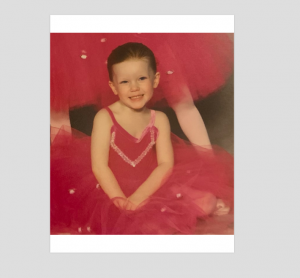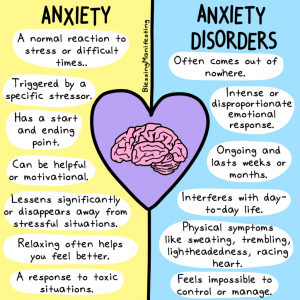Anxiety is something we have all experienced on multiple occasions in our lifetime. The first time I remember feeling anxious was when I was three years old. I was onstage in a pink tutu, my hair was in a slicked-back bun, and I had leather ballet shoes on my feet. It was my first dance recital. I included an image to the left so you can picture three-year-old me.

At that time, I was just starting my dance career, and I had never been on the stage before. I remember the lights were shining on me so brightly, and I knew my family (along with dozens of other people) were watching me. I was so nervous to perform in front of all of those people, and I decided that the best way to get out of that situation was to run offstage, tears falling down my face as I did so. My dance teacher at the time (bless his heart) talked to me and calmed me down from my panic before convincing me to go back onto the stage. I followed his advice, and I proceeded to take the stage that night and for fifteen years following that event. The anxiety I felt before going onstage never really went away, but it became a normal part of my life and became more manageable. This is a specific instance, but I have had many experiences with the feelings of anxiety—worry or unease about a specific event or condition.[1] In addition, I have been surrounded by anxiety disorders my entire life (even if I wasn’t aware of what it was at the time).
Anxiety disorders run in my family. I can think of multiple family members that have some sort of anxiety disorder, whether they admit it or not. Generalized anxiety, post-traumatic stress disorder, separation anxiety, and obsessive-compulsive tendencies are all anxiety disorders I have witnessed in my family. Anxiety disorders, however, are different from anxiety. Yes, they tend to share similar physical symptoms, but there are nuances that separate anxiety from anxiety disorders. As I previously stated, anxiety is the feeling of fear or unease concerning a specific event or condition. Physical symptoms of anxiety include elevated heart rate, sweating, having difficulty breathing, and nausea. Though anxiety disorders have these physical symptoms, as well, it is the effect the anxiety has on one’s life that makes it different from anxiety. Anxiety, because it is triggered by an event, has an anticipated end. If you are anxious about an exam you have, the anxiety will likely go away after you finish that exam. Anxiety disorders, on the other hand, are unpredictable—both in duration and triggers. The feeling of uneasiness can last twenty minutes, or it can last for three hours. The triggers can also be unpredictable. A family member I have that has PTSD is triggered anytime she sees rapids in a river, but my anxiety (GAD) is not necessarily triggered by anything. Anxiety disorders are unpredictable, but they are primarily characterized by feelings of anxiety and panic that are out of control, not appropriate for the situation, and interfere with daily activities.[2] More differences are outlined in the picture below.

Many people in today’s society think the term “anxiety” is synonymous with anxiety disorders. The incorrect terminology has been perpetuated through media and has had a generalization effect on anxiety disorders. Many people are guilty of generalizing anxiety disorders (I’m on the proverbial soapbox, but I have also been guilty of doing this), but this generalization makes it hard for anyone with diagnosed with an anxiety disorder to be taken seriously and feel understood. A common response to being startled is “you gave me a panic attack.” This statement invalidates people with panic disorder because now a panic attack is nothing more than a simple fright. Some individuals clean and straighten things up because “my OCD is bothering me.” This statement is invalidating to people with obsessive-compulsive disorder because OCD is now associated only with cleanliness and order—it disregards the two main characteristics of this disorder: obsessive thoughts and overwhelming compulsions.
The main point of this post is not to shame anyone or call anyone out (though I realize now that it seems like it). I just think it is important to spread awareness about the differences between anxiety and anxiety disorders. There are significant differences between anxiety disorders and the feeling of anxiety, and I think not a lot of people are aware of these differences. I think it is important to shed light on the generalization of anxiety disorders and how these generalizations can be hurtful.
[1] https://www.healthline.com/health/anxiety
[2] https://www.mayoclinic.org/diseases-conditions/anxiety/symptoms-causes/syc-20350961